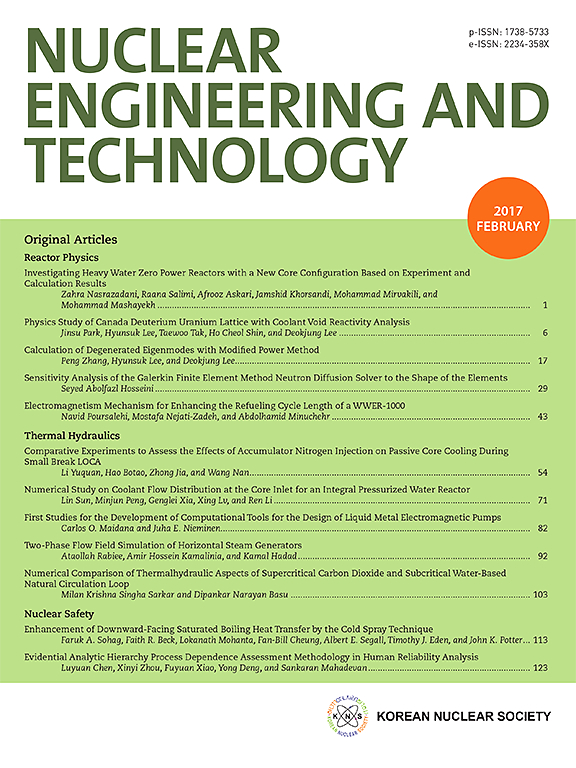Recycling efficiency optimization of tungsten-filled Vinyl-Methyl-Silicone-based flexible gamma ray shielding materials
IF 2.6
3区 工程技术
Q1 NUCLEAR SCIENCE & TECHNOLOGY
引用次数: 0
Abstract
Tungsten has been widely used for gamma-ray and X-ray radiation shielding, which is one of the main elements of shielding materials. Compared with traditional lead-containing shielding materials, tungsten-containing shielding materials have several advantages, such as good chemical stability, a high melting point and relative environmental friendliness. Considering the recycling of resources, the optimization of pyrolysis temperature and pyrolysis duration of tungsten-filled Vinyl-Methyl-Silicone-based flexible shielding materials needs to be studied. In this paper, these tungsten-filled Vinyl-Methyl-Silicone-based flexible shielding materials were initially recycled using pyrolysis. Subsequently, the crystal structures, surface chemical states and the tungsten concentration after pyrolysis in an argon atmosphere were characterized. In order to increase the tungsten recycling rate, the pyrolyzed samples were further recycled using the ultrasonic cleaning method. Furthermore, the influence of ultrasonic cleaning on tungsten recycling rate and surface morphologies was characterized and analyzed. It is found that the tungsten recycling rate of tungsten-filled Vinyl-Methyl-Silicone based flexible gamma/X-ray shielding material was around 69.9 wt%-81.6 wt% by using the pyrolysis method, while the recycling rate of tungsten can exceed 90.0 wt% by ultrasonic cleaning after pyrolysis.
优化钨填充乙烯基-甲基-硅基柔性伽马射线屏蔽材料的回收效率
钨已被广泛用于伽马射线和 X 射线辐射屏蔽,是屏蔽材料的主要元素之一。与传统的含铅屏蔽材料相比,含钨屏蔽材料具有化学稳定性好、熔点高、相对环保等优点。考虑到资源的循环利用,需要对填充钨的乙烯基-甲基-硅基柔性屏蔽材料的热解温度和热解持续时间进行优化研究。本文利用热解法对这些钨填充乙烯基-甲基-硅基柔性屏蔽材料进行了初步回收。随后,在氩气环境中对热解后的晶体结构、表面化学状态和钨浓度进行了表征。为了提高钨的回收率,热解后的样品使用超声波清洗法进一步回收。此外,还表征和分析了超声波清洗对钨回收率和表面形貌的影响。研究发现,使用热解方法,钨填充的乙烯基-甲基-硅基柔性伽马/X 射线屏蔽材料的钨回收率约为 69.9%-81.6 wt%,而热解后通过超声波清洗,钨的回收率可超过 90.0 wt%。
本文章由计算机程序翻译,如有差异,请以英文原文为准。
求助全文
约1分钟内获得全文
求助全文
来源期刊

Nuclear Engineering and Technology
工程技术-核科学技术
CiteScore
4.80
自引率
7.40%
发文量
431
审稿时长
3.5 months
期刊介绍:
Nuclear Engineering and Technology (NET), an international journal of the Korean Nuclear Society (KNS), publishes peer-reviewed papers on original research, ideas and developments in all areas of the field of nuclear science and technology. NET bimonthly publishes original articles, reviews, and technical notes. The journal is listed in the Science Citation Index Expanded (SCIE) of Thomson Reuters.
NET covers all fields for peaceful utilization of nuclear energy and radiation as follows:
1) Reactor Physics
2) Thermal Hydraulics
3) Nuclear Safety
4) Nuclear I&C
5) Nuclear Physics, Fusion, and Laser Technology
6) Nuclear Fuel Cycle and Radioactive Waste Management
7) Nuclear Fuel and Reactor Materials
8) Radiation Application
9) Radiation Protection
10) Nuclear Structural Analysis and Plant Management & Maintenance
11) Nuclear Policy, Economics, and Human Resource Development
 求助内容:
求助内容: 应助结果提醒方式:
应助结果提醒方式:


